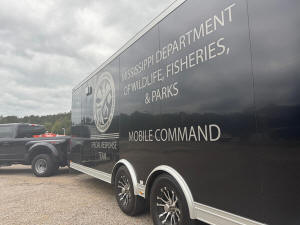Search is on for 3 escaped monkeys after truck overturns on Mississippi
highway
[October 30, 2025]
By SOPHIE BATES
HEIDELBERG, Miss. (AP) — Three monkeys remained on the loose Wednesday
as searchers in masks, face shields and other protective gear scoured
fields along a rural Mississippi highway where a truck carrying the
primates overturned a day earlier.
It remained unclear who owns the monkeys, who was transporting them and
where they were being taken when the truck crashed on Interstate 59
north of Heidelberg. Authorities have said most of the 21 monkeys were
killed but haven't elaborated on just what occurred.
The Jasper County Sheriff’s Department has said animal experts from
Tulane University examined the trailer Tuesday evening and determined
three monkeys had escaped.
The truck was carrying Rhesus monkeys, which typically weigh about 16
pounds (7.2 kilograms) and are among the most medically studied animals
on the planet. Video recorded after the crash showed monkeys crawling
through tall grass beside the interstate, where wooden crates labeled
“live animals” were crumpled and strewn about.
The truck was no longer at the scene Wednesday, but the searchers in
gear including white coats, gloves and hair nets were checking fields,
aided by law enforcement officers.
Jasper County Sheriff Randy Johnson said Tulane officials reported the
monkeys were not infectious, despite initial reports by the truck's
occupants warning that the monkeys were dangerous and harboring various
diseases. Nonetheless, Johnson said the monkeys still needed to be
“neutralized” because of their aggressive nature.

The monkeys were being housed at the Tulane University National
Biomedical Research Center, which routinely provides primates to
scientific research organizations, according to the New Orleans school.
The research center is located in Covington, Louisiana, about 40 miles
(65 kilometers) north of New Orleans.
The 21 monkeys had recently received checkups confirming they were
pathogen-free, Tulane said in a statement Wednesday. The university said
it wasn’t transporting the monkeys and didn’t own them, but sent a team
of animal experts to help with their care.
All other monkeys were being transported back to Louisiana.

[to top of second column]
|

The Mississippi Department of Wildlife, Fisheries and Parks set up a
mobile command in Heidelberg, Miss. on Oct. 25, 2025. (AP
Photo/Sophie Bates)

About 10 years ago, three Rhesus macaques in the breeding colony of what
was then known as the Tulane National Primate Research Center were
euthanized after a “biosecurity breach,” federal inspectors wrote in a
2015 report. The breach involved at least one staff member failing to
adhere to biosafety and infection control procedures, it said.
The facility made changes in its procedures and retrained staff after
that happened, according to the report from the U.S. Animal and Plant
Health Inspection Service. Earlier this year, Tulane made a slight
change to the name of the facility, replacing “Primate” with the word
“Biomedical.”
The Mississippi Highway Patrol said Wednesday that it was investigating
the cause of the crash, which occurred about 100 miles (160 kilometers)
from the state capital, Jackson.
Dr. James Watson, Mississippi's state veterinarian, verified that the
animals had the proper documents and “certificate of veterinary
inspection” for legal transport across state lines, he said in an email
to The Associated Press. The state's Board of Animal Health wasn't
involved in the response to the crash, and additional information would
need to come from Tulane, he said.
If anyone sees monkeys, they should call the authorities and shouldn't
approach the animals, the sheriff’s office has warned.
Rhesus macaques "are known to be aggressive,” according to the
Mississippi Department of Wildlife, Fisheries and Parks. It said the
agency's conservation workers were working with sheriff's officials in
the search for the animals.
The search comes about one year after 43 Rhesus macaques escaped from a
South Carolina compound that breeds them for medical research because an
employee didn't fully lock an enclosure. Employees from the Alpha
Genesis facility in Yemassee, South Carolina, had set up traps to
capture them.
___
Associated Press Writer Jeff Martin in Atlanta contributed.
All contents © copyright 2025 Associated Press. All rights reserved |